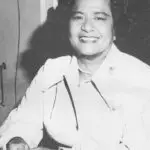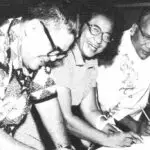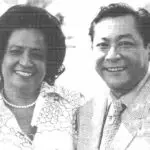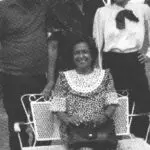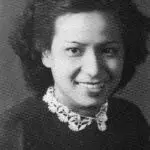Concepcion Cruz Barrett
Table of Contents
Share This
Business woman and senator
Concepcion Cruz Barrett (1915 – 1993), known as “Chong,” was the Chalan Pago-Ordot representative to the Guam Congress before the Organic Act of Guam was adopted by the United States Congress in 1950. Later, Barrett was a senator in the Guam Legislature, a leader of the Republican Party of Guam and served as its National Committee member. She also was a businessperson shortly after World War II, with her dress shop, the “Barrett Store,” located near where the present day US Post Office is in Hagåtña.
Barrett, the daughter of Isabela Valenzuela and Juan Garrido Cruz, was born in Hagåtña 5 December 1915.She was named class valedictorian from the Guam Evening School at her graduation in the early 1930s. Afterwards, she taught at the Richard P. Leary School in Hagåtña.
She met Jack Barrett, a young lieutenant in the Army, during a brief stop on Guam on his way to an assignment on Corregidor Island, Manila. In those days one way a young American man could meet a young Chamorro woman was to ask for her autograph. He saw many boys asking Chong for her autograph, so he did the same thing. He left for Manila shortly thereafter, and after a brief, long distance courtship, Chong followed him there. They married on 4 July 1939 in Manila.
Before long her husband Jack was transferred to Presidio, San Francisco, saving him from serving World War II in the Philippines and becoming a statistic in the Bataan Death March. For Barrett, though, it meant that she was cut off from her family on Guam for the entire Japanese occupation. When Guam was liberated she finally was able to petition to return home. Her husband was discharged from the Army due to a hearing loss he suffered while operating the huge 16-inch guns on Corregidor Island.
When they returned home, they brought a Buick for Barrett’s father, and soon opened Barrett Store in Hagåtña. Jack Barrett became close friends with Ken Jones (J&G Enterprises). The two were from North Carolina, and both were married to Chamorro women, and both were entrepreneurs in postwar Guam.
About that time Chong Barrett started getting involved in politics.She would travel to clothing shows on the US continent to buy merchandise, while Jack Barrett managed the store. During one of her buying trips, she was asked to testify in Washington, DC, regarding the passage of an Organic Act for Guam. Her testimony consisted of answering questions from the Congressional panel about the costs of eggs, milk and bread, and other business-related questions.
She closed with this statement:
We want American citizenship because we love and respect the United States and have proved our loyalty. We ask for your assistance. We hope for enactment of the organic legislation without delay. In order that you may understand more clearly the problems of Guam, I invite you, on behalf of my people, to visit our island. You have the power to give us the democracy which America is defending all over the world.
The Barrett’s sold their store for a considerable profit in 1949 and left Guam to travel, finally returning to Guam in the mid-1950s. Their oldest son Jack was born in San Francisco during the War, followed by their son Pat in Los Angeles, and finally, their daughter Elizabeth was born in Florida in 1953, while they traveled. When they returned to Guam their son Jack stayed in San Francisco to attend college.
In 1957 Chong Barrett decided she wanted to attend college as well and took her younger children back to San Francisco, where Jack was still living. Her husband stayed on Guam while working for Ken Jones. He eventually went to Manila to set up Jones’ heavy equipment and surplus yard there. Chong Barrett graduated from San Francisco State with a degree in political science, and applied to Hastings College of Law (now Hastings Law School). She was admitted, and completed one year of law school. The separation was hard on the family, however, so in 1960 she gave up her further educational dreams of becoming a lawyer to reunite her family in Manila. She and Jack had been separated for almost five years.
Barrett continued her education in Manila, however, and earned her Masters in political science from Ateneo de Manila, returning to Guam again after Typhoon Karen in 1962.
Barrett quickly became active in Guam politics again, and helped form the Republican Party of Guam. She worked in government for many years, and finally entered the race for the Guam Legislature in the late 1960s. Politics was her passion by then.
The primary election was a closed party race, and this fostered the village “pocket meetings,” where candidates and voters could meet and make plans for upcoming elections. Barrett went to both Republican and Democratic pocket meetings. She was an independent at heart, but a true card-carrying Republican National Committee member.
Barrett’s education in law postured her for various positions as legislative assistant in the 8th Guam Legislature and as property and relocation manager for the Guam Housing and Urban Renewal Authority (GHURA), as well as youth program coordinator for the Juvenile Justice Program, and a member of the Committee on Bar Examiners.
In 1970, Chong Barrett was elected to the 11th Guam Legislature, serving as a member of the Committee on Judiciary, Children and Youth and the Committee on Ecology and Environmental Protection. In 1974, she was re-elected to the 13th Guam Legislature, where she chaired the Committee on Judiciary. In her capacity as chairperson, Barrett enacted Guam’s Criminal and Correctional Code in 1975, and Criminal Procedure Code, reviving and consolidating all laws relating to crimes and criminal procedures — a major feat at the time.
Her colleagues referred to her as “the rose among the thorns,” while also acknowledging that she was an accomplished scholar. Barrett was also known for her contributions to Guam’s elderly. In her capacity serving as the Social Service director for the Office of Aging Division, Department of Public Health and Social Services, and as a Senator, Barrett was selected to be a delegate to the US Conference on Aging.
Chong Barrett passed away on 23 October 1993, but her legacy lives on in her children and grandchildren. Barrett’s son, John H. has two daughters, Jacqueline and Jessica. Barrett’s daughter, Elizabeth, son, Patrick, and her granddaughter, Lynnea N. Barrett, all followed in her dream of a legal career. Pat practices law in the Bay Area, Elizabeth on Guam and Lynnea, Pat’s daughter, graduated from law school in 2011.Elizabeth Barrett-Anderson, like her mother, also served as a senator in the Guam Legislature, leaving her legislative seat to accept an appointment as Judge of the Superior Court of Guam a position she held until her retirement in 2012.
For further reading
I Manfåyi: Who’s Who in Chamorro History. Vol. 2. The Hale’-ta Series. Hagåtña: Political Status Education and Coordinating Commission, 1997.

